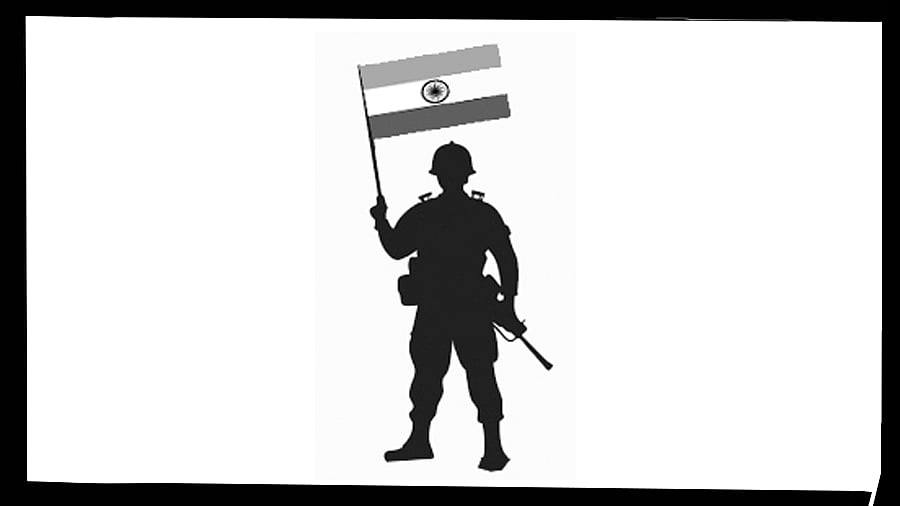
The Military is a pure command-and-control organisation, where hierarchy unabashedly matters. Ranks and posts are vested with clear authority, responsibility, and unimpeachable traditions. Symbolism is not a social nicety, as it can evoke deep cultural and psychological significance to become matters of life and death. The underlying ethos of Naam, Namak, and Nishan (name, fidelity, and flag) is not just hallowed symbolism but freighted with enough reasons to make the Indian soldier pay the “ultimate price”, to uphold the same.
The highest and the rarest-of-rare ranks to which a professional soldier can rise is the Field Marshal or Admiral of the Fleet for a Naval officer and Marshal of the Air Force for an Air Force officer, respectively. Evolved tradition (handed down from the former colonist: the British Army) mandates that today, it is a ceremonial rank conferred in recognition of extraordinary and transformational service to the nation. It is typically bestowed by the dispensation of the day in a participative democracy to valourise an individual as a Five-Star General Officer (higher than even the Four-Star CDS), albeit, without any operative or command responsibilities.
Sam HFJ Manekshaw who cavalierly led the Indian Army as its Chief of Army Staff during its “finest hour” of the 1971 Indo-Pak War (that split Pakistan into two) was promoted as the first Field Marshal “in recognition of outstanding services to the Armed Forces and the nation”. His investiture ceremony was held on January 3, 1973 – days before he retired, on January 15. However, with the honour of wielding the baton of the Field Marshal, he was beyond the scope of retirement.
The man Manekshaw held foremost as the reason for the Indian soldier’s timeless integrity, constitutionality, and apolitical bearing was India’s first native Commander-in-Chief, General (later, Field Marshal) KM Cariappa, OBE. Sam Bahadur generously attributed the Indian Army’s DNA of professionalism and restraint to the colossus – “He taught the Indian Army to be completely apolitical. Ours is one country, where soldiers have kept out of politics. I think that was the biggest achievement of Field Marshal Cariappa, the greatest service to this country”. Today, India owes the established doctrine of civilian control over the military, and therefore the healthy thriving of democracy, to Field Marshal KM Cariappa OBE, unlike the contrasting fate of Generals and democracy across the Line of Control i.e., Pakistan. Formative embedding of the dignified distance of the barracks from the politics, however, did not escape Pakistan’s first native Commander-in-Chief, Mohammad Ayub Khan.
Over 33 years after his retirement and at the ripe age of 87 years, on April 28, 1986, President Zail Singh conferred the rank of Field Marshal onto KM Cariappa OBE, as a token of a grateful nation’s respect and reverence to a proud and distinguished Indian soldier from Kodagu in Karnataka. The moving image of the “young” officer standing ramrod-straight and resolute whilst saluting the President is a masterclass in stateliness, dash, and élan, with the accompanying insistences of professional sobriety and apolitical rectitude, that behooves an Indian officer. Similarly, the only Marshal of the Indian Air Force, Arjan Singh, who restored India’s wounded dignity in the 1965 Indo-Pak War as the victorious Chief of the Indian Air Force, was awarded the Marshal rank years later in 2002 (he retired in 1969).
Power, outsized and appropriated
Importantly, none of these three distinguished soldiers had any political significance or role attached after their elevation to the 5-Star status, or thereafter. This Indian reality exemplifies the democratic principles and traditions that ensure that the constitutionalist Military is strictly under the control of the civilian government (as should be in any democracy) and exercises violence and kinetic operations, only in service of public good, territorial integrity, and for the dignity of the nation.
However, in the Pakistani narrative, the Military has an extra-constitutional role that ensures that it rules the roost, officially (following coups e.g., by the likes of Ayub Khan, Zia-ul-Haq or Pervez Musharraf) or behind the scenes (like now). The supremo of the current coalition of unnaturals i.e., PML-N and PPP, Nawaz Sharif once derided the invisible hand of the Pakistani “establishment” (read Military) in almost all decision-making as Khalai Makhlooq (the hand of “aliens”). Today, the same discredited Sharif family owes their unpopular rehabilitation to the farcical leadership to the same Pakistani Generals and hence remain completely indebted to the current top General, Asim Munir.
Unlike the first native Indian Commander-in-Chief, KM Cariappa OBE who strengthened the roots of Indian democracy, his Pakistani counterpart – Ayub Khan – has the infamy of leading the coup d’etat to become the President himself. Along the way, the vain and ambitious Ayub Khan had elevated himself as the first Field Marshal. It was a shameless tact adopted by his equally unprofessional successors such as Zia-ul-Haq and Pervez Musharraf, who forsook the Field Marshal route and went straight for Presidentship!
That a distraught and shaky Asim Munir (the false public posturing of “victory” in the four-day conflict notwithstanding) could get the duty-bound Pakistani Parliament to confer Field Marshal onto himself is a giveaway of the real power behind the façade. The reality is that Pakistan has been hit militarily and socio-economically and to counter the mood against the Pakistani “establishment”, Munir had to indulge in theatrical self-glorification (even unsaid intimidation) as the Field Marshal, to control the narrative.
Like the so-called civilian government that was effectively “selected” by the Pakistani “establishment” as opposed to “elected” (the country’s most popular leader, Imran Khan, is incarcerated), even the Pakistani Field Marshals are self-appointed for decidedly political reasons and owing to their ruthless ambitions. While both Indian and Pakistani militaries are born from the same fount – their moorings, like their Field Marshals, are fundamentally different.
(The writer is a former Lt Governor of Andaman & Nicobar Islands and Puducherry)
Disclaimer: The views expressed above are the author's own. They do not necessarily reflect the views of DH.